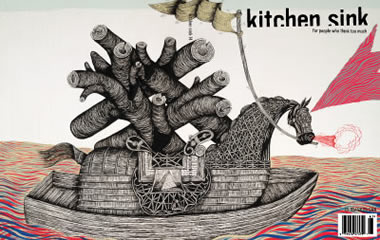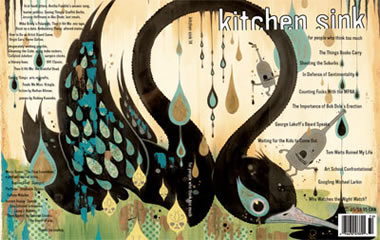
23 AUG 07
an interview with Jeff T. Johnson
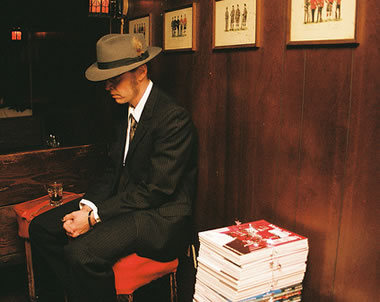
In poetry, the distinction between a book and a chapbook usually has to do with how a collection is bound and how long it is. Is yours a chapbook?
I consider The Record Room to be a chapbook. It's 53-pages long, but I designed and bound it myself. For the past few years, I've been making an annual chapbook of the best poems I wrote that year. The chapbooks vary in length, depending on my output that year, but this is the longest one I've made (last year's was 40 pages), and it's the first one I've put in a store (Clay carries it at Pegasus Books in Berkeley, where I did a reading with Kaya Oakes and sold a bunch of copies). It's probably also the most book-like of my chapbooks, in terms of flow and concept (it's set up like a double album with four sides/sections, and architectural and music-related themes run through the poems). I call it a chapbook because I made it myself, and out of habit. I think of chapbooks as self-produced books, regardless of length, though I realize I'm getting to the point where I should pick the best poems from my past few chapbooks and get a manuscript together.
You're taking an unusual approach to being a published poet. Tell me about that. Is it the result of a philosophical stance, or temperament, or something else?
I started to think about publishing poetry in college, but the more I learned about poetry, the less I felt ready to publish. It seemed like a better idea to read as much as I could and to focus on writing poems instead of worrying about revising and submitting poems. Eventually I developed habits of revision, which led to chapbook making, because I always showed in-progress poems to friends, but I wanted to collect batches of finished poems to show my friends and my family. I also wanted to make sure I finished poems and moved on, and chapbooks give me a sense of retrospect on each year's work that I've incorporated into my writing process.
I still think about publishing in journals, but it seems like a means to an end--I read books of poems, and I like what happens to poems when they are collected and arranged by a poet in a volume; however, I don't get a comparable enjoyment out of reading journals, unless multiple poems by a poet appear together. I want to make books, and I realize that in order to publish a book I probably have to first publish in journals, but I have trouble getting excited about submitting to them. This has something to do with the absence of context in journals, and it has something to do with my stubborn aversion to assembling a list of publications for the sake of catching someone's eye. It also has something to do with procrastination. I've been telling myself I'll submit poems from this chapbook, but I haven't done it yet.
Do you like designing books & constructing them? Any desire to make them for others, to become a publisher?
I love handmade books, and I love the idea of making them. My motivation is inconsistent, because I get distracted by reading, writing or other projects, but once I lower my head and get to arranging, designing, gathering materials and binding, I fall happily into it. I was a founding editor of Kitchen Sink magazine, which recently stopped publishing due in part to a meltdown at our distributor, which got me thinking about self-publishing. In particular, I'd love to get some people together to do a chapbook press. Kitchen Sink was the pilot program of a still-extant nonprofit called Neighbor Lady Community Arts Project, run by some of the same people who staffed the magazine, and we've been talking about the possibility of making books. In the past we talked about starting a sort of traditional press, but I'm starting to cheerlead for a chapbook press. The time is right to go back to handmade and self-distributed books.
Are your previous books still available? How many do you make of each? Do you make more when the supply runs out or are they limited edition by choice? Aside from going to Pegasus, how can your book be purchased?
I usually only make about 30 chapbooks each year and give them all out. This year I made 76. Actually, I've probably made 40 or 50 of them, and I have supplies in my kitchen to make the rest. Pegasus still has a couple copies, and I'll keep them stocked for as long as my supply lasts. I made more books this year with the intention of bringing them to readings, but I've been out of town so much it's been difficult to plan anything. Anyone who is interested can email me (raygonne at earthlink dot net) about buying a copy.
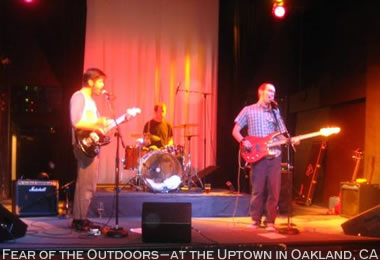
You also make music. Do you put out your own recordings?
I've played in three bands. Two of them (century schoolbook and fear of the outdoors) made two albums apiece, which we packaged ourselves to give away to friends and sell at shows. The other band (nasturtiums) made at least 15 albums, most of which were 2-man musical improvisations with poems and lyric snippets I'd bring to our practice space. We used to give out tapes, but at some point we went digital, so now we burn CDs.
How does (or did) your ambivalence about poetry journals relate to your experience as an editor of Kitchen Sink?
I used to aspire to write about music for local weekly papers and other magazines, and I did write a bit for the SF Weekly and Pitchfork, but I liked writing for Kitchen Sink much better. I got more out of working on my own project and collaborating closely with others, rather than working with an editor who couldn't care less about me or my writing. I don't want to describe music and I don't want to tell people what CDs to buy. I enjoy writing about the way I think when I listen to music; or, rather, I like music to soundtrack and infiltrate my writing. I don't want to work on assignment, and Kitchen Sink's editorial mission was pretty much to let writers do what they do best, without too much editorial interference. Some of our writers would affirm that if they read this, and some would laugh maniacally, drain and refill their drinks. It was always my intention to help create exactly the type of magazine to which I would like to contribute, and I'm spoiled by that experience.
When did you start writing poetry and why? Did you focus on writing or literature in school?
I started writing poetry as a kid, but I really got into reading it in high school. I got serious about studying poetry in college, which is also when I got more serious about writing poetry. I was a literature major at UC Berkeley with a minor in German lit, and I took as many poetry courses as I could in both departments. I wrote my senior thesis on the poetry of William Carlos Williams, and wrote my honors thesis on Allen Ginsberg's poetry. I also took a poetry writing workshop with Jane Hirshfield my senior year, which I remember quite fondly. That's where I met two of my most trusted poetic conspirators. After I graduated, I plunged headlong into John Ashbery's poetry and discovered a whole new (to me) world. Reading poetry encourages me to write, but ultimately I do it because of the thrill I get out of poetic engagement.
Do you speak German?
I used to be semi-fluent. I studied abroad in Germany and Austria, and I spent two summers in Germany and Austria, writing for a travel guide. I still read some poetry in German (favorites: Trakl, Hölderlin, Celan), but I try never to speak German because I get depressed about how much I've forgotten. I have a difficult enough time expressing myself in English.
What do you do for a living? Do you like it?
I'm an architectural illustrator--I measure and draw buildings. I like it because I'm an independent contractor and have a flexible schedule, and because it seems to exercise a different part of my brain than letters do. However, my experience with buildings has entered my poetry for the last few years. I've gotten good responses from friends about that crossover, so I've been working on a series of poems based on particular jobs I've done in various cities--I stay in a hotel for a month or so, drawing and writing poetry and exploring and not talking very much.
You measure and draw existing buildings? Why are those drawings needed?
"Asbuilt" plans are needed for a variety of reasons, but usually they are needed to get construction permits. Also, architects can't work from blueprints, if those are even available, because the actual construction of a building typically deviates from the original plan. A building's history also takes a toll on it, and architects want to know about the existing condition of a building before they adapt the drawings I provide to their purposes. However, what I create is strictly (and precisely) a drawing of what exists. I do not speculate on future plans for the building.
Could we include a small example of your architectural drawing?
I've sent along a couple drawings from a project that informed some of the poems in the chapbook. I've made better-looking drawings of more interesting buildings, but the experience of living in and drawing this particular building had a significant influence on my poetry at the time.


They're scaled way down, which makes them pretty crammed, but you get the idea; also, I want to make sure they aren't too legible.
Drawing, making music, writing--do you consider one of these activities to be "central" with others more orbiting around it, or do they each have a similar weight and your free movement between them forms a kind of whole? Any other things you're doing that would also be part of this set?
Out of all the things I do, writing is most important to me, and everything else, directly or indirectly, serves writing or springs from it. Architectural illustration pays the bills, but it's gotten into my head enough that it ends up in my poetry as well. I play bass, but as far as music goes, I am most interested in writing lyrics and singing, which are closely related to poetry. Also, I am able to collaborate musically in a way that is an extension of poetic collaborations and partnerships of which I have been a part. My writing and editing work with Kitchen Sink was similar to that in terms of collaboration. Poetry is closest to my heart, but I know that all writing is writing. Any time I put words together I take care with them.
How would you characterize your ambition?
I am ambitious about writing poetry but I am conflicted about publishing it. I wouldn't say that I write poetry primarily for myself or even for my friends. I want people I don't know to read my poetry. I want to make books and I would like them to be published, but I'm not in a great hurry for that to happen. My greatest ambition is to continually get better at writing poetry. I've got a big green chest of poems in the middle of my room, and I've been making chapbooks and handing them out so the poems are not lost to a hard drive or notebook. Maybe I'm waiting for some imperative to submit, and I don't know if that will take the form of a sense of progress or achievement in my poems, or if the ambitions of my friends will spur me on, or if I will just become impatient with my own reticence and get in the habit of sending finished poems to journals.
Do you see making these chapbooks as a prelude? If so, to what? Or, if you put together a manuscript, what would you do with it then?
The chapbooks are complete in themselves, in that they mark my progress and chart my preoccupations each year, but I do hope they lead me to a manuscript. I've learned a lot about sequencing poems, and it would be fun to select poems from my chapbooks, re-sequence them, and make connections and byways with new poems. I would like the chapbooks to be the first steps in narrowing down my poems to my best work. I'll probably do another chapbook before I put together a manuscript, and along the way I'd like to get into the habit of seeking publication in journals and chap/book contests. However, if these chapbooks are the prelude to bigger and better chapbooks, well, that's preferable to smaller, shittier chapbooks.
The Record Room has a really nice feel to my eye and hands. Is the production entirely a one man show--I mean is everything done by you including printing and folding and all the punching and stitching?
After I pick and sequence poems, I think about artwork and layout, and then I go to a paper distributor and select the paper and coverstock (I'm partial to linens). I print a sample chapbook (unassembled) and go make copies of that, bringing the paper I've selected. After that I assemble everything: I do all the folding (hooray for bone folders!) and punching (I use an electric hand drill) and stitching (with a book needle). For the past two years, my friend Tara helped me realize the cover design, and she's the one who showed me how to make this style of book.
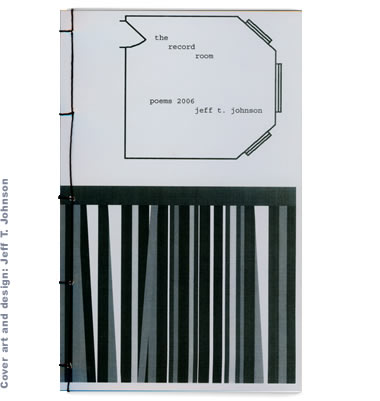
Do you enjoy giving readings? How does it compare with performing music live, in terms of how you anticipate it, what you feel while doing it, and what seems to happen between you and the audience?
I love reading poetry out loud, and when other people are listening, I love it even more. I love what I learn about poems (my own and others') when I read them out loud to an audience. I used to get pretty shaky and nervous when I read to a crowd, but that changed when I started performing live music. Music performance seemed easy after having read poems in front of strangers. Playing music with others keeps your mind occupied, and once you get warmed up, your anxieties drop off. That's how it is for me, anyway. Reading poetry is a naked exercise. It can be exhilarating, but also nervewracking.
On the other hand, you can look pretty stupid on stage playing music, even if you get to the point where you don't care if you look stupid. At any rate, I was surprised how relatively relaxed I felt playing music on stage, and after that, I felt a lot more comfortable reading in public (whether it's essays or poetry). Actually, I feel more confident reading (or performing, if you like) poetry or prose than I do playing music, because I know that writing is what I do best, and I choose what I'm going to read based on how well I think I can pull it off in front of an audience. I'm bringing my best stuff, so I'm rearing to go. When I play music, despite the comfort zone of the band, I feel like the most receptive audience members are trying to be supportive and polite (which is to say those people are my friends), and when I read to a good audience, I know I can win some of them over.
The last reading I did was Kaya Oakes' book launch party at Pegasus in Berkeley, and Kaya brought out a big crowd, many of whom didn't know me or my poetry. I'd just finished my chapbook and was really happy for Kaya and generally excited, and I probably gave the best reading of my life, and people were really into it. People I didn't know came up after the reading to ask me to sign a book, and I'd never been on that side of a book signing before. That was months ago, and I'm still thrilled by the experience. I just hope a couple of them have opened my book since then!
:
a poem by Jeff T. Johnson:
Some Other City
In the window lit-up words a block away fight through trees
like classic memories like meals we do not regret
the idiom Is this the transcription
is this the war is this the year
Each day something historic occurs
in this part of the country
the shining mirror the collapsing tray of lipstick
arranged by shade next to extended watches
like a store like a drain to the bay
Some Wednesday I'll be free
We'll go to the Missouri
but last night
was impossible
The penmanship is careful on your hand
it says
carefully
it says
which park
this means something
but our interpretations are oblique
Jar me on a traffic island
hide but don't look like you're hiding
pass me that bag let's hope the car is moving
when we look back down
As long as this lasts
will you
As long as this lasts
will you remember
Will you remember the songs
I remember the songs
. . .
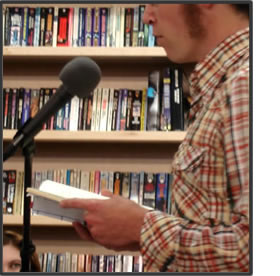
. . .
next interview: Jess Mynes
. . .
